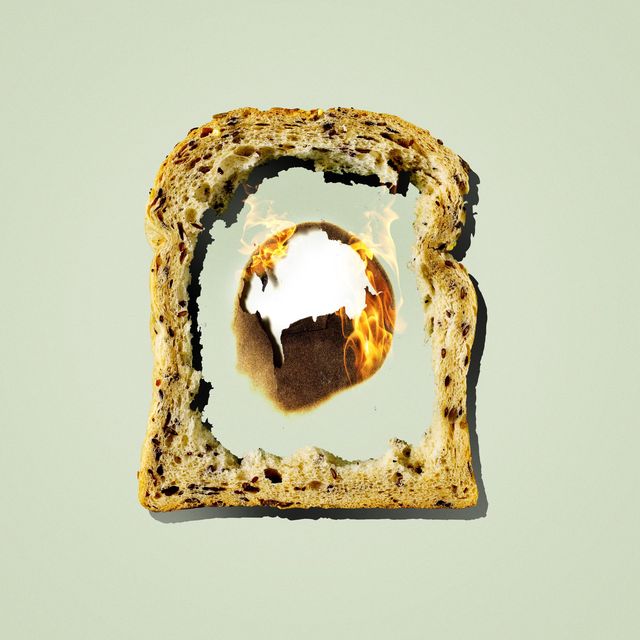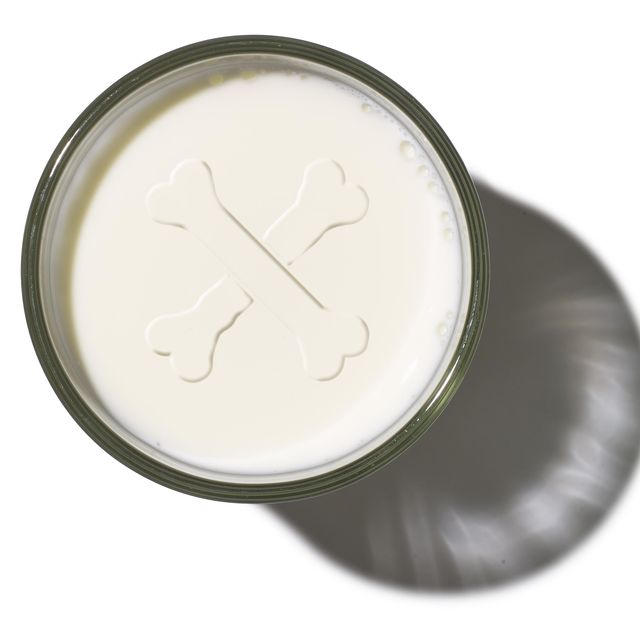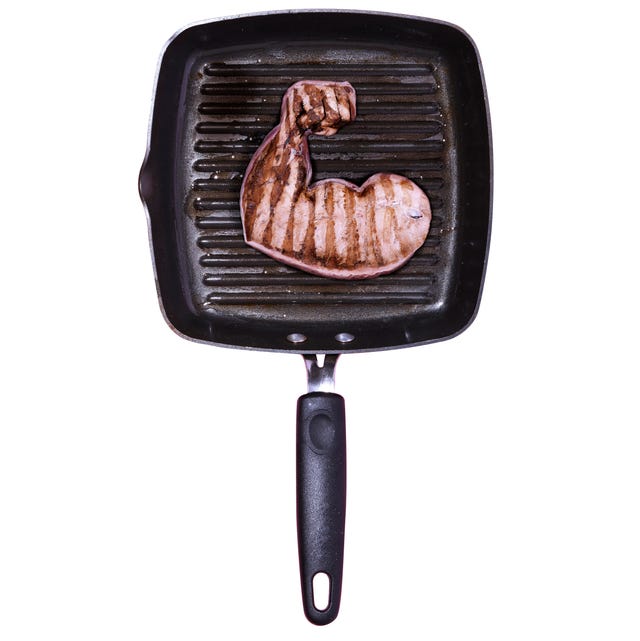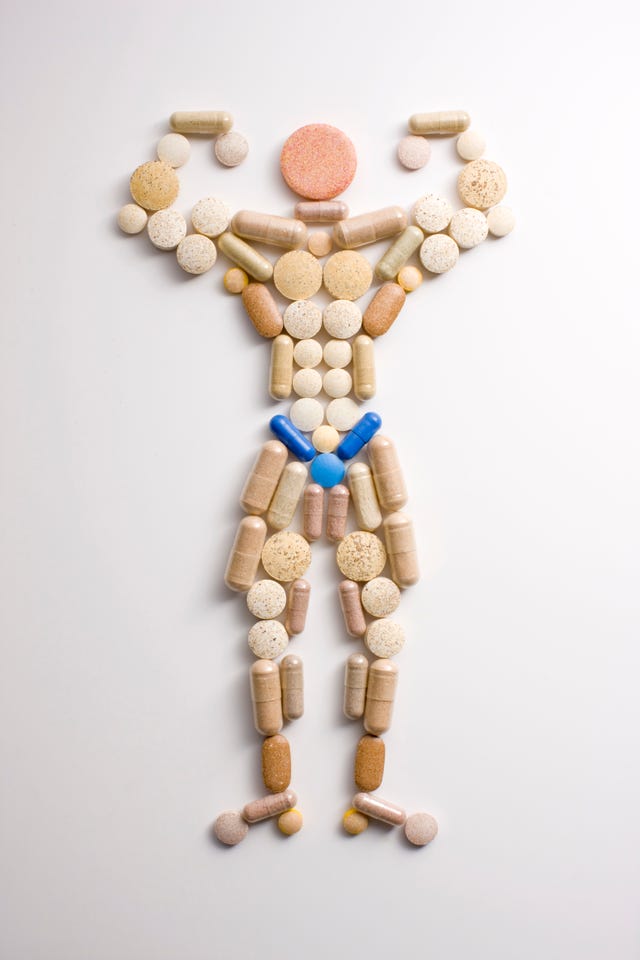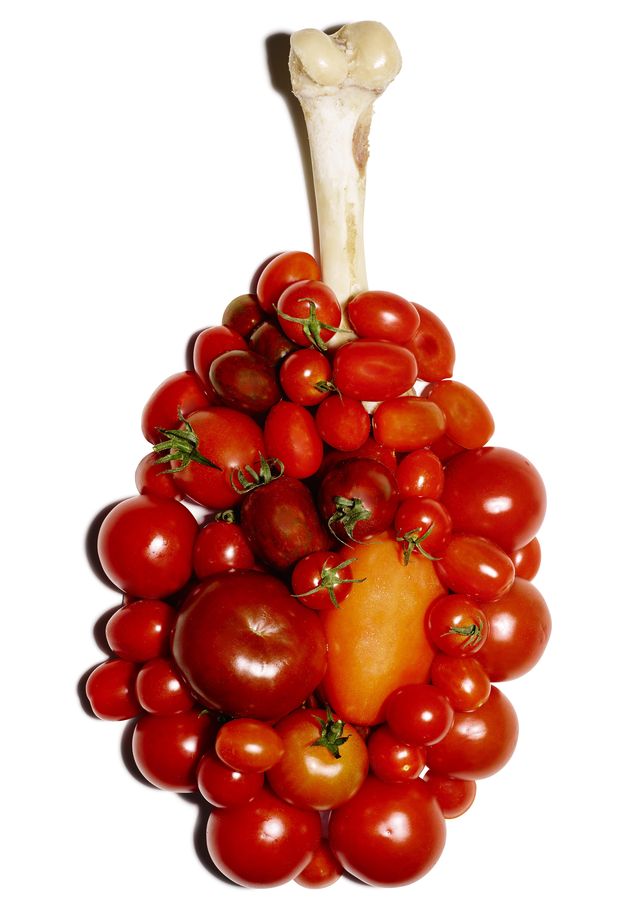Navigating the factual maze that is the modern nutrition industry is no easy task – even the most clued up among us can lose our way. Yesterday’s cure-alls are tomorrow’s compost as diets drift in and out of favour. To shed a little light, we asked a panel of experts to tell us about the myths and pseudoscientific theories they frequently come up against – then debunk them. Here’s your bite-sized guide.
1. Breakfast Is the Most Important Meal of the Day
“Cereal companies put a lot of marketing money into making people believe this,”says PT Hendrick Famutimi. “But really, as long as you’re eating enough nutrients after training, your body will have what it needs.” If you prefer a light morning meal, refuelling with gusto after your midday workout is a perfectly effective strategy. The same goes for those on a 16:8 intermittent fasting protocol.
Research suggests that it’s not breakfast that keeps you lean, but rather that people with a higher BMI tend to eat later in the day. So, what will make a difference? Eating your calories within daylight hours can help: in one University of Pennsylvania study, those who ate out of sync with their circadian rhythms had poorer profiles of blood glucose, cholesterol and triglycerides.
2. Cutting Carbs Is the Smartest Way to Lose Weight
The term “carbs” may have become synonymous with bread and pasta but, in reality, they’re found in a variety of foods, from leafy greens to oats and lentils. “Are we seeing higher levels of obesity in the UK because we’re overeating oats and lentils? Not based on any current data,” says Ryan Andrews, who points out that body composition is “influenced by countless factors, from stress to sleep” – not just your partiality for buttery toast. So, why the confusion?
Eating carbs raises blood sugar levels, triggering the release of insulin, a hormone that controls fat storage. But this is a normal biological process and, as long as you’re feeding your body with the right amount of energy to meet its demands, there’s no reason you’ll put on extra padding. True, some people lose fat on a low-carb plan: “Cutting back on carbs, like any other food, can put you in a calorie deficit,” says Famutimi. But it’s no magic bullet. Some of the healthiest people in the world eat plenty of carbs: only 4% of Japanese men are classed as obese, even though rice and noodles are staples.
3. If You Eat Carbs After 6pm, They’ll Be Stored as Fat
“Some people think that if you eat carbohydrates before going to sleep, they’ll have a negative effect because your metabolism will slow down,” says Famutimi. “It doesn’t work like that.” View your energy balance like your bank balance: what matters are your habits across the course of the month, and a splurge is a splurge no matter whether it’s Friday night or Tuesday afternoon. Plus, if you’re an after-work athlete, there are benefits to a well-balanced dinner: “I advise most of my clients to eat higher-carb meals after a workout,” says Famutimi. “That’s when the body craves those nutrients.”
4. Quitting Dairy Leads to Calcium Deficiency
“Milk does a body good” was the 1980s marketing campaign that first positioned dairy as the antidote to osteoporosis. And for the roughly 40% of adults globally who have no trouble digesting it, dairy has its benefits: it’s a source of vitamins D and B12, phosphorus and, of course, bone-building calcium. But tofu, soya milk, pak choi, kale, plus certain beans, nuts and seeds are also rich sources. Many foods are fortified with the mineral, too: in the UK, calcium is added to flour by law. In other words, enjoy dairy if you like it – but you don’t gotta get milk.
5. A Raw Food Diet Is Best for Nutrient Uptake
Not all foods are best eaten raw: after all, self-denial isn’t in itself beneficial. Cooking increases the bioavailability– the ease with which your body can extract and use a nutrient – of lycopene and beta-carotene, the health-boosting nutrients found in orange and red foods such as tomatoes, carrots and sweet potatoes, plus leafy greens such as spinach. What’s more, pairing foods containing fat-soluble vitamins A (tomatoes and carrots again), D (mushrooms), E (asparagus and chard) and K (kale, broccoli, Brussels sprouts) with fats like olive oil or butter also helps.
6. To Build More Muscle, All You Need Is Protein…
“Our bodies can’t make protein from scratch. We need it from our diets,” says Sinead Roberts. “So, protein is essential for building muscle.” However, it is not the only ingredient in muscle growth. “The process is largely regulated by a molecule called mTORC1, which is switched on by strength training. But to stay switched on, it requires energy – ie, calories.”
An abstemious diet of lean meat and leaves won’t cut it. Not only do you need enough protein, you need to eat enough in general. “Research has compared ‘simple’ protein foods, such as egg whites, to more complex foods, such as whole eggs, which also include fats and extra micronutrients,” says Roberts. “The results show that some whole foods might be more effective in supporting muscle protein synthesis.” Find what works for you.
7. …And You Need That Protein Immediately After Training
Your digestive system is smarter than you give it credit for – it is able to absorb and store amino acids for when your muscles need them. According to a review in the Journal of the International Society of Sports Nutrition, your pre- and post-exercise meals can be separated by about four hours without hindering your growth. “It takes hours for your body to go into a catabolic state,”says Famutimi.
8. You Should Never Eat High-GI Carbs
“It’s all about context,”says Steve Grant. The glycaemic index (GI) ranks how carb-containing foods impact your blood sugar levels, but combining carbs with proteins, fats and fibre dampens the blood sugar response. A jacket potato, for example, might score highly, but a spoonful of tuna mayo and some avocado will bring its GI right down.
“In fact, in some circumstances, high-GI carbs can even be beneficial,” Grant points out,“particularly when you want to replenish your glycogen stores after training.” People react differently, too. “Our gut microbiome has been shown to influence the glycaemic index of a food,” says Grant. “We all have unique responses. The index is perhaps too crude a measurement.”
9. The Right Superfoods Will Help to Supercharge Your Metabolism
There’s a crucial difference between “supercharge” and “support”. Micronutrients, including B vitamins and certain minerals, will support healthy metabolic function. But a pinch of chilli powder or a spoonful of apple cider vinegar won’t help your body to incinerate calories in any meaningful way. At best, they’ll assist with blood sugar balance and satiety. That may be less sexy, but it’s still useful.
“There was a time when people thought that if you took a spoonful of coconut oil before a workout, you would burn more fat,” says Famutimi. This, again, is specious. The MCT fats in coconut oil appear to improve fat oxidation compared to other forms of fat, but it’s a case of marginal gains – and won’t compensate for the fact that you’ve just eaten a spoonful of oil.
10. Giving Up Sugar/Dairy/Wheat/Caffeine Can Help Your Body to Detoxify
Detox from what? In 2009, an investigation of 10 detox companies by independent research body Examine found that none of them could name any of the toxins they purported to eliminate. Things have not improved in the decade since. “The phrase ‘detoxing’ is overused,” says Grant.“Though I don’t disagree that we’re exposed to more toxins than ever, cutting out sugar, dairy and so on isn’t what I would class as a detox.”
Avoiding foods that are causing you digestive issues (potentially, but not always, including the aforementioned groups) will support your body’s detoxification process. “But a calorie deficit has the potential to increase toxin exposure, as some toxins may be stored up in fat cells,” cautions Grant. Instead, he advises increasing your intake of high-nutrient whole foods and digestion-boosting fibre, while adding the occasional sauna session to your gym schedule.
11. You Can’t Get Too Much of a Good Thing
Flooding your body with synthetic vitamins in the hope of reaching nutritional nirvana does not work. Micronutrients offer diminishing returns: “Many are ‘hormetic’ – they have an increasingly beneficial impact up to a certain point, then above that, they begin to have an adverse effect,” says Roberts. Take, for example, vitamin C: the “upper tolerable limit” is 2,000mg per day, after which you might experience side effects such as nausea or trouble sleeping. Read the labels and, if you’re worried about deficiencies, get a blood test before topping up.
12. A Healthy Diet Shouldn’t Require Supplements
Most nutritionists advocate a “food first” approach. As Roberts puts it, “A vitamin C tablet just provides vitamin C, whereas a portion of beetroot provides vitamin C, nitrates, potassium, manganese, fibre, folate…” However, there are some nutrients that it’s hard to get from diet alone. These include vitamin D3 (aim for 10ug a day, from October to March), EPA and DHA fatty acids, unless you’re eating plenty of oily fish (store these in the fridge, as light and heat degrades them),and vitamin B12 for vegans. Meanwhile, there are supplements that might be useful for athletes, including creatine for muscle mass and strength, and nitrates for aerobic performance. Even the most well-balanced eating plan can be optimised.
13. Cheat Meals Help You Burn More Calories
This is a hot topic now,” says Roberts. It’s true that dieting for an extended period can cause your metabolism to slow. Cheat meals – or even cheat weeks – have been proposed as a way to prevent this. That could mean bringing your calorie intake up to maintenance levels (hardly cheating), or even introducing a surplus. “For the period when you’re refeeding, your metabolic rate might be restored,” says Roberts,“but studies suggest that it will fall again when you return to the diet.”
That’s not to say that boosting your calorie intake is of no benefit, however. A recent study noted that a break decreased “diet fatigue” – the boredom of being deprived of your favourite foods – “so it may help people adhere to an eating plan, and therefore see more weight loss”.
14. Plants Aren’t a Real Source of Protein
“Humans love categorical thinking,” says Andrews. “It’s not uncommon to hear people say that meat is a protein, whole grains are a carbohydrate and nuts are a fat.” In reality, most foods contain a variety of macro- and micronutrients. Though it’s true that many plant-protein sources are “incomplete” – they don’t contain all nine essential amino acids – this is only a problem if there’s no variety in your diet. Vegans should eat one portion of cooked legumes per day, such chickpeas, to get lysine.
15. The More Fat You Eat, the More You Burn
“Humans can survive and thrive on a variety of dietary patterns,” says Andrews. “But manipulating fat intake doesn’t appear to be as important to body composition as other factors, such as aiming to eat a high-quality diet –minimally processed, with plenty of plants.”
A ketogenic diet, in which 70% or more of your calories come from fat, pushes the body into a fasting-like state in which the body switches from using glycogen as a fuel source to using ketones. But it’s energy balance – not fuel source – that dictates weight loss and gain.
16. Eating Little and Often Will Stoke Your Metabolism
Despite all the talk about “burning”, “incinerating” and “torching”, your metabolism is not a furnace. You won’t stoke it with hourly kindling and smother it with a hunk of wood. Multiple analyses and reviews conclude that meal frequency will make little difference to your metabolic rate. What you eat matters more. Meanwhile, a Japanese study noted that fasting provokes “a metabolically active state”. Put that in your furnace and smoke it.
17. “Natural Sugars” Are Good for You
“There’s not a huge difference between ‘natural’ sweeteners and sugar,” says Grant. “There may be a few more micronutrients in sugars like molasses, date syrup and honey, but from a calorie and macronutrient perspective, they’re pretty much the same. So, it’s still important to be mindful of your intake.” In other words, factor those organic flapjacks into your recommended 30g daily limit.

Scarlett Wrench is the Senior Editor at Men’s Health UK.
With more than 12 years’ experience as a health and lifestyle editor, Scarlett has a keen interest in new science, emerging trends, mental well-being, and food and nutrition. For Men’s Health, she has carried out extensive research into areas such as wellness in the workplace, male body image, the paradoxes of modern masculinity, and mental health among school-age boys.
Her words have also appeared in Women’s Health, Runner’s World and The Sunday Times.


